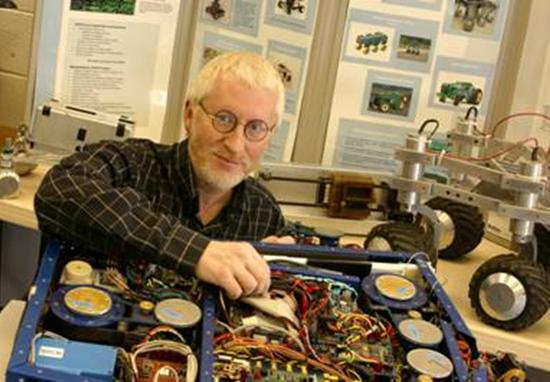IEEE
ICMA2006 Conference
Plenary
Talk
Towards
Autonomous Systems: From Control Systems to Intelligent Control to Intelligent
Behavior Generation to Cooperative Autonomy
Kevin
L. Moore, Ph.D., P.E.
G.A. Dobelman Distinguished
Chair and Professor of Engineering
Division of Engineering
Colorado
School of Mines
,
U.S.A.

Abstract:
Today
a number of enabling technologies have matured to the point that it is possible
to build robots and intelligent machines that are physically capable of
autonomous behavior. However, to achieve the promise of autonomy, we also need
equivalently-mature information-processing and decision systems to exploit
these physical capabilities. In this talk we discuss the problem of devising
truly autonomous systems in three parts, describing several threads of research
from the speaker乫s experience. In
Part 1, we begin with a discussion of intelligent control, including
its promise and reality, introducing specifically the paradigm of iterative
learning control (ILC). After highlighting and critiquing the history and
accomplishments of ILC, we posit that in fact intelligent control has not
achieved its promise and argue that as we try to develop increasingly
autonomous systems we need better understandings of the purpose (goals), the
components (memory, learning), and organization of intelligence (models,
language, architecture). From this motivator, in
Part 2 we consider how to move beyond conventional intelligent control
to develop intelligent behavior generators for single-system autonomy, focusing
on mobile robots operating in semi-structured environments. We present an
intelligent, reactive command and control system that uses a multi-resolution,
hierarchical task-decomposition strategy based on a grammar of atomic actions.
The effectiveness of the strategy is demonstrated in actual tests with real
robots in which the path-planning and control algorithms are implemented in a
distributed processing environment. We show the use of the behavior generator
for ODIS, a low-profile omni-directional (ODV) robot developed for
under-vehicle inspections at security checkpoints that has recently been
commercialized, and for the T2 and T4 robots, larger ODV vehicles that can
serve as marsupial mother-ships for the ODIS robots as part of a multi-robot,
integrated parking area security system. This part of the talk concludes with
comments on extensions to include learning and synthesis of reactive behaviors
within the behavior generator. Part 3
of the talk looks to the next frontier of autonomy: cooperative behavior of
multiple autonomous entities. We discuss this notion from the idea of what we
call a dynamic resource network, in which mobile, autonomous actuators and
sensors cooperate to accomplish a global objective in a spatial-temporal
domain. We present a number of motivating examples of such networks, including
cooperative UAVs for data exfiltration,
landslide detection, and center-pivot irrigator control for farming. We then
introduce a control-theoretic framework that can be used for mobile actuator
and sensor networks when the underlying phenomena are diffusion processes.
Preliminary results from a Mote-based experimental testbed
are presented to illustrate the ideas and the technical and theoretical
challenges posed by the problem are discussed, which point to a number of
exciting new directions for systems and control researchers.
Kevin
L. Moore is the G.A. Dobelman
Distinguished Chair and Professor of Engineering in the Division of Engineering
at the Colorado School of Mines. He received the B.S. and M.S. degrees in
electrical engineering from
Louisiana
State
University
and the
University of Southern
California, respectively. He received the Ph.D. in electrical engineering, with
an emphasis in control theory, from
Texas
A&M
University
in 1989. He was a senior scientist at Johns Hopkins University's Applied
Physics Laboratory during a one-year research leave of absence, where he worked
in the area of unattended air vehicles, cooperative control, and autonomous
systems (2004-2005); an Associate Professor at Idaho State University
(1989-1998); and a Professor of Electrical and Computer Engineering at Utah
State University, where he was the Director of the Center for Self-Organizing
and Intelligent Systems, directing multi-disciplinary research teams of
students and professionals developing a variety of autonomous robots for
government and commercial applications (1998-2004). He also worked in industry
for three years pre-Ph.D as a member of the
technical staff at Hughes Aircraft Company. He is a seminal contributor and
active researcher in the area of iterative learning control. His other research
interests include autonomous systems and robotics, and applications of control
to industrial and mechatronic systems. He is the
author of the research monograph Iterative
Learning Control for Deterministic Systems and co-author of the book
Sensing, Modeling, and Control of Gas Metal Arc Welding. He is a
professional engineer, involved in several professional societies and editorial
activities, and is interested in engineering education pedagogy, particularly
capstone senior design. He is a senior member of IEEE and serves as a member of
the IFAC Technical Committee on Computers, Communications, and
Telematics and of the IEEE Control System Society Technical
Committee on Intelligent Control.